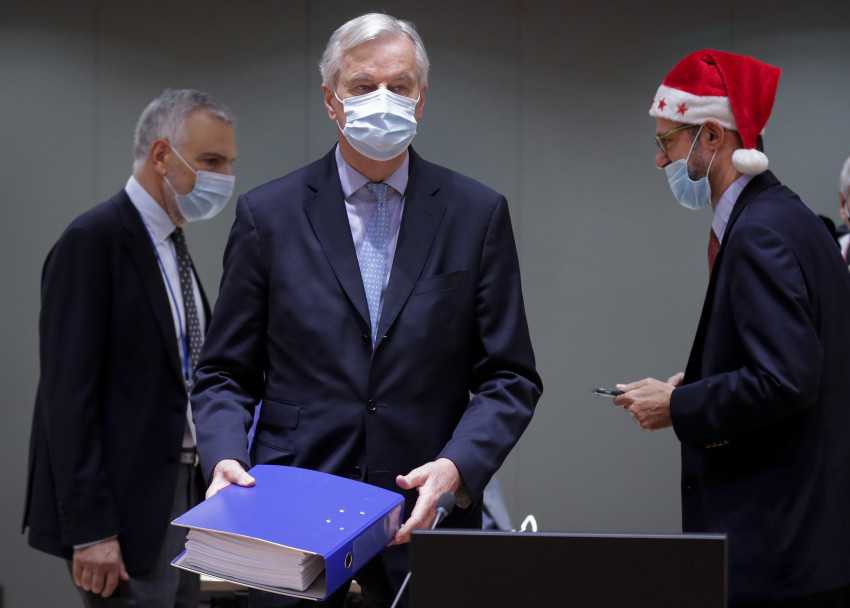No time to rest: EU nations determine Brexit trade manage UK
26 December, 2020

The fast-track ratification of the post-Brexit trade deal between the UK and europe got underway on Christmas Working day as ambassadors from the bloc's 27 nations started assessing the accord that takes effect in weekly.
At Friday’s exceptional conference, the ambassadors were briefed about the facts of the draft treaty, which is thought to be around 1,250 webpages much time, by the EU's chief Brexit negotiator Michel Barnier.
They are set to reconvene again on Mon and also have informed lawmakers at the European Parliament that they intend to have a decision on the preliminary application of the offer within days.
While voicing their sadness at the rupture with Britain, EU leaders are relieved that the tortuous aftermath of the Brexit vote had come to a summary in Thursday's agreement about future trade ties.
All member says are anticipated to back the arrangement as may be the European Parliament, which can only provide its consent retrospectively since it can't reconvene until 2021. British lawmakers have to give their acceptance, too, and are being summoned in a few days to vote on the accord.
Both sides claim the agreement protects their cherished goals.
British Primary Minister Boris Johnson said it offers the UK control more than its money, borders, laws and fishing grounds. The EU says it defends its solitary market of around 450 million persons and includes safeguards to ensure the U.K. does not unfairly undercut the bloc’s standards.
Johnson hailed the arrangement as a “new start” for the UK in its romantic relationship with European neighbors. Opposition leaders, even those people who are minded to again it because it's much better than a no-deal situation, said it adds unnecessary costs on businesses and does not provide a apparent framework for the key services sector, which makes up about 80% of the British economy.
In a Christmas message, Johnson sought to market the offer to a weary public after years of Brexit-related wrangling since the UK voted narrowly to keep the EU in 2016. Although the UK formally left the bloc on Jan 31, it continues to be in a changeover period tied to EU rules before end of the year.
With out a trade deal, tariffs could have been imposed on trade between your two sides starting Jan 1. Both sides could have suffered in that situation, with the British overall economy taking a greater struck at least in the near-term, since it is more reliant on trade with the EU than vice versa.
“I have a tiny present for anybody who may be seeking for something to learn in that sleepy post-Holiday lunch minute, and here it really is, tidings, glad tidings of superb joy, because that is a deal,” Johnson said in his video concept, brandishing a good sheaf of papers.
“A deal to provide certainty to organization, travelers and all investors inside our nation from Jan 1. A deal with our friends and partners in the EU,” he said.
Though tariffs and quotas have already been avoided, you will see more reddish colored tape because as the UK is going to be leaving the EU's frictionless sole market and customs union. Firms will need to file varieties and customs declarations for the first time in years. There may also be different guidelines on product labeling along with checks on agricultural products.
Despite those additional costs, various British businesses who export widely over the EU voiced alleviation that a package was finally set up since it avoids the potentially cataclysmic imposition of tariffs.
“While the deal is not fully comprehensive, it in least provides a basis to build on found in future,” said Laura Cohen, leader of the British Ceramic Confederation.
One sector that are disappointed may be the fishing sector with both sides voicing their discontent at the new arrangements. Arguments over angling rights were largely behind the delay in achieving an agreement.
Under the conditions of the offer, the EU gives up 25 % of the quota it catches in UK waters, much less compared to the 80% Britain initially demanded. The machine will be phased in over 5 1/2 years, and quotas will get reassessed.
“Found in the end, it had been sharp that Boris Johnson sought an overall trade deal and was ready to sacrifice angling,” said Barrie Deas, leader of the National Federation of Fishermen’s Organizations.
The French government, which experienced fought hard for fishing access, announced aid because of its fishing industry to greatly help deal with the smaller quota, but insisted that the deal protects French interests.
The president of the French ports of Calais and Boulogne-sur-Mer, Jean-Marc Puissesseau, said whatever is in the Brexit trade package, existence for his port can be more challenging because “there won't be free motion of merchandise.”
Some 10,000 careers on the Boulogne area are linked with fishing and its seafood-processing industry, he said, and about 70% of the seafood they use comes from British waters.
“Without seafood, there is absolutely no business," he told The Associated Press.
Source: japantoday.com
